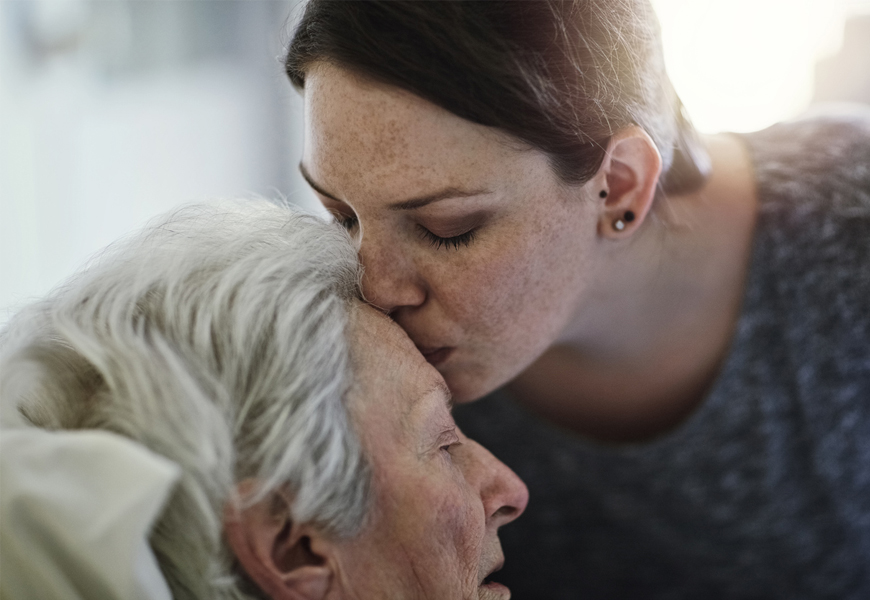We go by many names—family caregiver, in-home care, and the Sandwich Generation. We are the people taking care of our parents and our kids. We’re stuck in the middle of a whole group of people who need us. Who need things from us constantly. Who present us with the biggest challenges, and greatest rewards every single day.
My mother was diagnosed with Multiple Sclerosis in 1975. My father is an amputee. At some point, it just seemed blocked-headed not to invite them to live with my family. Construction happened, dust and chaos happened, and eventually, they were living in my daylight basement. Soon, it became obvious that mom needed a lot more help than I was able to provide before and after work each day. I quit my job and became a stay at home parent/daughter/writer. My husband works 24-hour shifts 60 miles from us, so from a practical standpoint, someone needed to be around more.
And then the bottom dropped out, and my mom was diagnosed with cancer.
The daily care Dad and I were providing to her became more labor-intensive and took longer and longer each week. It was work we did without much complaining; my mother was worth every challenging moment. As the cancer progressed, it became a force, a whirlpool that sucked all of us into it. Mom needed so much from me. Through all of it, my children also needed so much from me.
Parenting through grief is a complicated game in which nobody wins. The person you are providing care for feels guilty because you’re already doing so much. Your children, depending on their age, can only understand snippets of why your time is divided. Your spouse is shoved to the backburner in terms of quality conversation and intimacy. When you have spent the day coordinating hospice visits, trying to nap train a baby, make a normal meal for the family, purees for the baby, and a pure liquid diet for your parent, the only thing you want to do at the end of the night is collapse and weep.
There are lighthearted moments when you soak in all the love that you are surrounded by because you know it won’t be intact forever. You laugh and tell stories about childhood, and you listen. You listen to all the stories you were never told. And you ask questions you never thought you should ask.
Most days I felt like I was pulled in so many directions and no one was getting the best version of myself. Never known for my patience, I snapped easily at the little people in my life. Mommy doesn’t want to read you another story because Mommy has been up since 4 am cleaning up after everyone in this damn house. Outbursts of “is there no one who can do anything for themselves right now?” were common. They were often followed by minute long rants that made me want to crawl into my own body and punch myself. I knew my words hurt as I was saying them, and I knew I wasn’t being fair to my kids.
To exacerbate the situation, we hadn’t been 100% straightforward with my oldest child Jack about mom’s condition. He is a highly anxious kind of kiddo, and the idea of staying up many nights answering all his questions was simply more than I had the capacity to handle. We finally called in the pros and talked to a social worker on my mom’s hospice team. Her recommendation was being honest with Jack about the situation. She said that kids who are anxious are going to be anxious no matter what you do. Giving them the information allows them to “name” their anxiety, which can go a long way in helping them cope with what they are feeling.
Sitting my eight-year-old down and telling him his grandmother was going to die very soon was one of the hardest things I have ever done. The actual discussion went okay, but saying those words to him was also the first time I had said them out loud. We all cried together and talked about why sometimes bad things happen to really good people. Our social worker helped me frame the conversation, and allowed us to head off any spirals down panicked rabbit holes. Per her suggestion, we talked about the fact that there are some illnesses where people get better and some illnesses where people don’t. And that grandma wasn’t going to get better. We reinforced that cancer isn’t something that happens overnight, and won’t take us away from him suddenly. We held him and told him we loved him and that we were there to answer any questions he had. And boy, did that kid have questions.
It’s been over a month since I held my mom’s hand while she took her last breath. It is too soon for me to say that we’re okay, but I know we will be at some point. A friend of mine who lost her father recently told me that you get better at dealing with pain, and eventually, you give yourself permission to keep living without them without feeling guilty. I don’t know when that day will come, but I do know that I am adding the capacity just a little bit at a time to be more patient with my kids and loved ones. Sometime in the near future, I even hope to have the ability to take care of myself. God willing.

Sorry for your loss. I can relate to this. Mothering while dealing with cancer. My husband was diagnosed with advanced Melanoma when I was pregnant with my first in 2009. He is still in alive and in active treatment 8 years later. Life is so interesting. Grief is part of it for sure. Much love to you and yours.